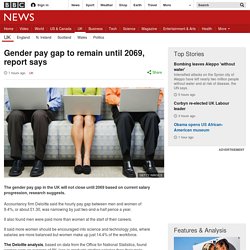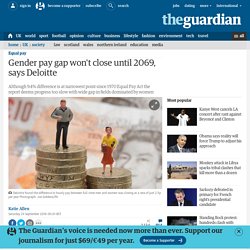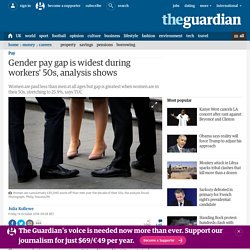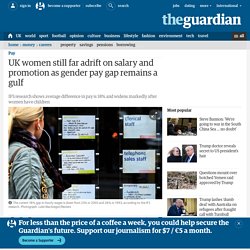

Nigel Farage Explains Why Women Are 'Worth Less' Than Men. Nigel Farage has said the gender pay gap exists because women who have children are "worth less" to employers than men.

According to the Ukip leader, discrimination over pay does not exist because female employees without children do "as well or better than men". Speaking at a debate in the Square Mile, he claimed women with children are responsible for their own reduction in pay if they have children – because they take maternity leave and become less valuable to their businesses. Bn186. The Gender Pay Gap – The Fawcett Society. Despite the Equal Pay Act 45 years ago, women still earn less than men in Britain today.

The difference in pay between men and women remains the clearest and most dramatic example of inequality for women. What is the gender pay gap? Overall, women can expect to earn significantly less than men over their entire careers as a result of differences in caring responsibilities, clustering in low skilled and low paid work, the qualifications and skills women acquire, and outright discrimination. The current overall gap for full time workers is 13.9% What are the causes? There are four big causes of the gender pay gap: Discrimination It’s illegal, but some women are still paid less than men for the same work – this can happen when a man and a woman are doing exactly the same role and receiving different pay, or where work of equivalent value carried out by women is underpaid. Unequal caring responsibilities. What does the gender pay gap really mean for women? Gender pay gap to remain until 2069, report says.
Image copyright Getty Images The gender pay gap in the UK will not close until 2069 based on current salary progression, research suggests.

Accountancy firm Deloitte said the hourly pay gap between men and women of 9.4%, or about £1.30, was narrowing by just two-and-a-half pence a year. It also found men were paid more than women at the start of their careers. It said more women should be encouraged into science and technology jobs, where salaries are more balanced but women make up just 14.4% of the workforce.
The Deloitte analysis, based on data from the Office for National Statistics, found women earn an average of 8% less in graduate starting salaries than their male counterparts across all science, technology, engineering and mathematics (STEM) subjects combined. This compares with 9% less across all other industries. Career paths But the Deloitte report showed there was no pay gap in starting salaries across medicine, dentistry, engineering and technology. Role models. Gender pay gap won't close until 2069, says Deloitte. It will be more than half a century before the gender pay gap closes in the UK, according to a report that highlights the gulf between men and women’s earnings, even at the outset of their careers.

Progress on closing the pay gap has been so slow that on current trends it will not be eradicated until 2069 – or 99 years after the 1970 Equal Pay Act – according to an analysis by consultants Deloitte. Laying bare the challenge for government as it seeks to tackle inequality, the report finds that at the very start of their working lives, women graduates are earning less than their male peers in many jobs. That gap holds true even in sectors where women workers dominate, such as healthcare and teaching. In all but one of 10 popular occupations for graduates, men start out on higher average salaries than women. In all 10, the gap widens over time. That is despite more than three-quarters of graduates in the sector being female. Gender pay gap is widest during workers' 50s, analysis shows. Women get paid less than men at every stage in their careers but the gender pay gap is widest during their 50s, according to new analysis.

The pay gap begins as soon as women start working and is at its greatest when a woman turns 50, with female employees cumulatively £85,040 worse off than men over the next decade, according to TUC analysis of figures from the Office for National Statistics. The TUC analysis shows that the gender pay gap widens steadily from 9.1% for 18-year-olds to 25.9% for women in their 50s and then falls slightly to 22.8% for those in their 60s. When women turn 50 they earn £8,504 less a year than men, as caring responsibilities for children and older relatives take their toll on female earnings. UK women still far adrift on salary and promotion as gender pay gap remains a gulf. Women earn 18% less than men on average, according to new research that highlights the challenge facing Theresa May in closing Britain’s stubbornly wide gender pay gap.

The Institute for Fiscal Studies (IFS) also found that the gap balloons after women have children, raising the prospect that mothers are missing out on pay rises and promotions. That is echoed by a separate report on Tuesday suggesting that male managers are 40% more likely than female managers to be promoted. May highlighted the gulf between men’s and women’s earnings in her first statement as prime minister when she vowed to create a “Britain that works for everyone”.